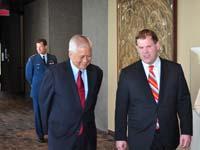Philippines wants Canada to end degrees of separation

Canada is exploring investment ventures in the Philippines through public-private partnership (PPP) projects particularly in infrastructure and mining, according to Foreign Secretary Albert del Rosario.
Del Rosario said over the weekend that Ed Fast, Canadian minister for international trade, is leading a Canadian business delegation to the country this August to look into possible businesses that Canada could enter in the Philippines.
The Canadian trade minister told del Rosario in a meeting in Ottawa that there is “much more potential that needs to be explored because Philippines-Canada trade is relatively modest.”
Fast assured his visitor that Canada’s mining companies have good track record in responsible mining, saying Canada is known as the “world’s miner.”
Del Rosario, in turn, assured Fast that Canadian mining companies can have wider access to doing business in the Philippines, citing President Aquino’s expected signing of an Executive Order that strikes a balance between economic gains from “extractive industries” and environmental protection.
Canada is strengthening its economic presence in the Philippines and other member-countries of the Association of Southeast Asian Nations (Asean) as the regional bloc builds a single market and production base by 2015. The other Asean economies are Brunei Darussalam, Cambodia, Indonesia, Laos, Malaysia, Myanmar, Singapore, Thailand and Vietnam.
Canada is the Philippines’s 19th-largest trading partner with a two-way trade volume in 2011 worth $797.78 million in favor of Manila.
Philippine exports to Canada last year were valued at $417.79 million while imports from Canada reached $379.99 million.
Del Rosario, also during his visit to Canada last week, sought Ottawa’s recognition of educational degrees earned in the Philippines to facilitate deployment of more skilled workers to Canada.
He raised the matter during a meeting with Jason Kenney, Canada’s minister for citizenship, immigration and multiculturalism.
A million jobs in the health, oil and mining sectors remain unfilled in Canada owing to its strict academic standards for skilled workers and professionals.
Del Rosario said degrees earned in some countries, including the Philippines, are downgraded when assessed in Canada due to differences in curricula and the required number of years needed in getting college degrees.
“For instance, a college graduate in the Philippines is considered as having completed only two years of college education in Canada,” he added.
The Philippines has been Canada’s largest source of temporary and skilled workers since 2010, with around 30,000 workers deployed per year surpassing India and China.
There are now around half a million Filipino immigrants in Canada, most of them highly skilled workers and professionals.
Del Rosario said Canada continues to attract a huge number of Filipino migrant workers because Filipinos share close affinity with Canada’s traditional values, religious beliefs and adherence to law.
Kenney said Filipinos in Canada continue to contribute to the country’s economic growth as well in enriching culture and society.
He added that Canada’s success results from its focus on welcoming highly skilled workers and migrant professionals including those from the Philippines who are critical in further developing the Canadian economy.
Del Rosario said that Canada would continue to attract a greater number of Filipino workers in the coming years, as he noted that Filipinos share close affinity with traditional Canadian values of hard work, respect for tradition, devotion to family, religious tolerance, and adherence to the law.
The Philippines has been Canada’s largest source of temporary and skilled workers since 2010 (around 30,000 a year), beating India and China, which previously dominated Canada’s labor market.
Secretary del Rosario was accompanied to the meetings in Ottawa by Philippine Ambassador to Canada Leslie B. Gatan, Foreign Affairs Undersecretary for Policy Erlinda Basilio, Assistant Secretary for American Affairs Patricia Ann V. Paez, Ms. Cosette Canilao, Executive Director of the PPP Center of the Philippines, Director Senen Mangalile, and First Secretary and Consul Eric Gerardo Tamayo of the Philippine Embassy in Ottawa.
Leave a comment









